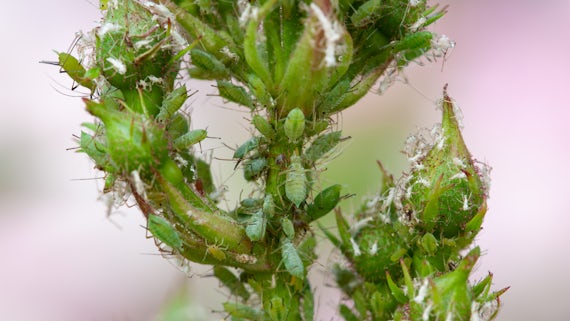Safe pesticide replacements in the pipeline
3 Mawrth 2020

Cardiff University researchers have discovered a cost-effective and scalable means to produce terpene analogues for use as green alternatives to pesticides.
Terpenes are naturally occurring chemical substances produced by plants to repel pests as a biological defence. They are responsible for the heavy aroma and pungent flavours of their host. By harnessing these ‘odours’ (volatile organic compounds), new environmentally friendly repellents and attractants are being developed for insect management.
As alternatives to traditional pesticides, these molecules naturally drive herbivorous insects away from crops, attract predators including parasitic wasps, and maintain a healthy balance of pollinators. Terpenes also have vital pharmaceutical applications, including in the development of life-saving antimalarial drugs.
Producing terpene molecules at the scale required for industrial use, such as crop protection, is expensive, inefficient and in most cases unfeasible.
In a new study published in the German Chemical Society journal Angewandte Chemie, scientists from Cardiff University’s School of Chemistry have found a way to produce terpene analogues using cheap materials that are suitable for large-scale production.
The team, led by Professor Rudolf Alleman, has produced a variety of terpene molecules including a whitefly repellent (7-epizingberene) and an aphid repellent (germacrene-D). They have also created an aphid attractant (14,15 dimethylgermacrene-D), which can be used to lure pests into trap devices or onto sacrificial plants from where they can be easily removed.
The researchers are currently using their biochemical method to produce quantities of compounds for field trials of novel agrochemicals, which was not possible using earlier chemical methods.
"The ease of the method allows us to step forward in producing these molecules on scales required for crop protection and other applications. This is essential if we are to mitigate against the damage caused by current pesticides, but to continue producing the quantities of crops needed to support the world’s growing population."
The research may even extend beyond pesticides. The team hope to create a variety of terpene analogues for wide and varied applications within agrochemistry and medicine. Their latest work will screen enzymatically produced terpene analogues and look for responses in aphids.
This research was supported through grants from the U.K. Biotechnology and Biological Research Council (BBSRC).

